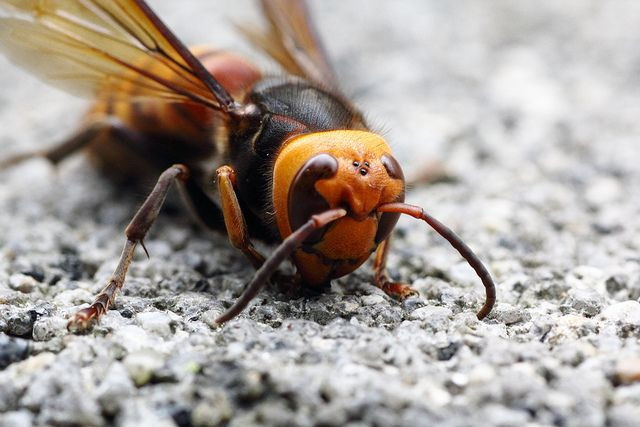Giant Hornets Kill 42 In China: Carnivorous Vespa Mandarinia Targets Humans, Honey Bees

Giant hornets have killed 42 people and injured 1,675 in the central Chinese province of Shaanxi over the past three months. Government reports indicate that 37 patients remain hospitalized after being attacked by vicious swarms of the Vespa mandarinia — a 1.5-inch, carnivorous hornet that produces a venom so powerful it dissolves human tissue. Officials are now running extensive prevention strategies in an effort to curb the deadly population.
The cities of Hanzhong, Shangluo, and Angkang have reported fatal attacks throughout the summer and early fall. Across the rural province, the giant hornets have plagued farmworkers as well as school children. Speaking to CNN, local victim Mu Conghui said she received 200 stitches and 13 dialysis treatments over the two months that she spent in the hospital.
"The hornets were horrifying," she said. "They hit right at my head and covered my legs. All of a sudden I was stung and I couldn't move. Even now, my legs are covered with sting holes."
Although the species is implicated in about 30-50 allergy deaths annually, the soaring fatality rate has scientists and officials investigating possible environmental factors. Some say that the surge in attacks is the result of unusually dry weather. Others point to the recent dearth of natural predators like spiders and birds.
Shunichi Makino, director general of the Hokkaido Center for Forestry and Forest Products Research Institute, said that inaccessible nests make prevention measures complicated. Although government agencies have already destroyed about 710 hives, many remain hidden. Even in individuals without allergies, the sting can be extremely serious, Makino said.
"The venom of an Asian giant hornet is very special compared with other hornets or yellow jackets," he said. "The neurotoxin — especially to mammals including humans — it’s a special brand of venom."
Human victims aside, experts are now voicing concern that the giant hornets will slash the nation’s honey bee population. The carnivorous Vespa mandarinia is known to launch coordinated attacks on wasp and bee hives, wiping out entire colonies in a matter of hours. Japanese studies indicate that the broods extirpate tens of thousands of honeybee hives each year.



























